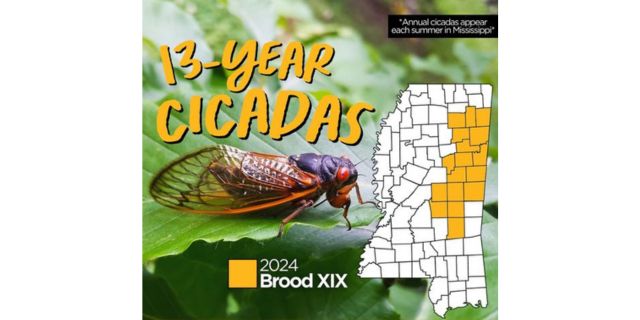Mississippi counties preparing for the song of the cicadas
Published 11:22 pm Monday, April 8, 2024
Two natural phenomena have dominated water coolers and social media posts so far this year. Now that the eclipse is over, it’s time to prepare for cicadas.
Mississippi State University Extension Entomologist Dr. Blake Layton authored the following article to explain:
In the South, we have three broods of 13-year cicadas, each of which occurs in its own geographic area and emerges on its own schedule. This spring, thirteen-year cicada Brood XIX, also known as the Great Southern brood, will emerge in parts of 15 states, including at least 17 counties in Mississippi (see map).
Trending
Mississippi is the only state that has all three broods of 13-year periodic cicadas. By tradition, periodic cicada broods are numbered using Roman numerals. Brood XIX will emerge this year, Brood XXII will emerge next in 2027, and Brood XXIII in 2028.
There are 12 broods of seventeen-year cicadas, but these occur farther north. Seventeen-year cicada Brood XIII will also emerge this year, in northern Illinois and a few surrounding states. But NOT in Mississippi! So, you don’t need to worry about parts of Mississippi having seventeen-year and thirteen-year cicadas at the same time.
Periodic cicadas are attention-getting insects, not only because of their appearance, black and orange with red eyes, and their loud singing, but also because of their numbers. Suitable habitats, such as upland hardwoods, can have hundreds of thousands of cicadas per acre, with the male half of the population singing loudly in the trees to attract females. If you spend much time outdoors and live in an area where these emerge, you are not likely to miss them.
Mississippi also has annual cicadas. These are winged and have greenish bodies and prominent, bulging eyes. Mississippi has around 20 species of annual cicadas, mostly in the Tibicen genus, and their songs vary considerably.






